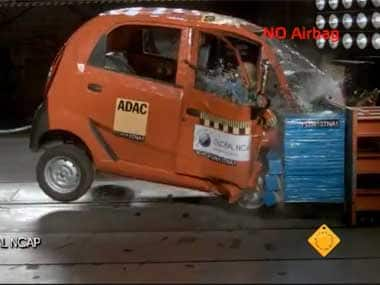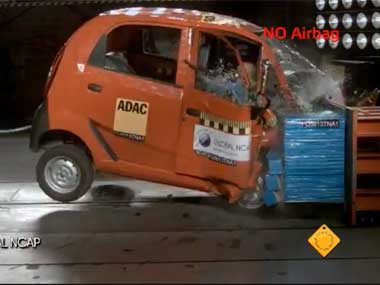Are cars sold in India safe enough? Global testing agency NCAP’s shocker, where it found five Indian small cars failed frontal crash tests, has failed to generate enough debate on the subject.
NCAP took five Indian cars - Maruti Alto 800, Tata Nano, Hyundai i10, Ford Figo and Volkswagen Polo. There were two tests carried out on identical cars of the same make - meaning two of each car were procured by Global NCAP from India. The tests were conducted at 56 kmph and at 64 kmph.
Tim Leverton, Head Advanced and Product Engineering at Tata Motors told Firstbiz earlier, “Safety is of paramount importance to Tata Motors. All our vehicles, including the Tata Nano meets all Indian safety regulations, including the frontal barrier crash test at 48 kmph, as mandated by the government. All our cars on Indian roads, including the Nano are engineered for safety in view of Indian road and traffic conditions.”
Car makers made convenient excuses: cars sold in India conform to Indian regulations and that installing safety features seen in global markets such as airbags and ABS will raise vehicle prices.
[caption id=“attachment_75209” align=“alignleft” width=“380”]  The Nano during the Global NCAP test. Image courtesy: Youtube[/caption]
Both the arguments used by car makers to defend the infensible have been demolished by Dinesh Mohan, Volvo Chair Professor Emeritus, Transportation Research & Injury Prevention Programme.
In a article written for Business Standardhe makestwo important points:
- do not fall for car makers’ fallacious argument that installing extra safety features in cars will make them costly. He says airbags and anti-lock braking systems can be provided for as little as Rs 15,000 in addition to the existing price.
- he also quotes a study which says that customers are being forced to buy expensive cars in the name of enhanced safety, since some features are not made available on base variants. The extra money you cough up to buy the variant with extra safety features is actually charged for trappings such as stereos, leather, extra chrome.
Mohan knows a thing or two about car makers and their devious devices so there is no reason to doubt his assertions. Why would car companies not want to offer you the option of an air bag, ABS or other safety features in the base version of every model? Obviously, something is not right here.
At one of the car unveilings in a run up to the Auto Expo, a senior car company executive admitted that base variants of all cars may not have all safety features like airbags but most other variants come with enhanced safety options. He parroted the same line: our cars conform to Indian safety standards. His views have been echoed by most car makers at various times.
Let me come to another curious argument car makers have used to stall competition. Last year, there was a very public spat between two large vehicle makers over permitting a vehicle category called quadricycles in India. Quadricycles are four wheelers which do not qualify as cars because they are lighter, have lower top speeds and are usually restricted to operating within city limits instead of being permitted to operate on highways.
They do not meet crash test norms either. But they are largely being seen as safer options to three wheelers which anyway ply on city roads today given quadricycles will be covered from all sides. It helps they have a higher top speed than three wheelers.
Car makers wanted India to rule out this category completely because they fear sales of their mini cars would be hit. The question now is not whether quadricycles are unsafe but why are even cars just as bad. At least in the case of quadricycles, they have restrictions on top speed and intra-city usage.
Just because of dense traffic conditions in our cities, vehicle makers and regulatory authorities have a ready excuse of not making vehicles compliant with crash tests at higher speeds. Though it is fact that most fatalities on Indian roads involve two wheelers and pedestrians, the number of car accidents has risen too.It is time the government amends crash testing norms and provides adequate testing facilities within India for car makers to upgrade safety norms.


)
)
)
)
)
)
)
)
)



